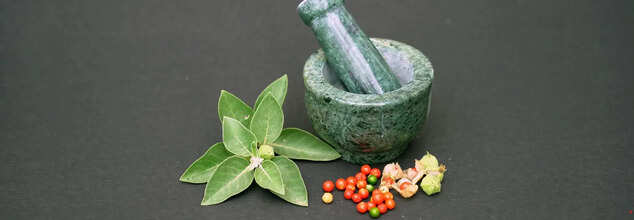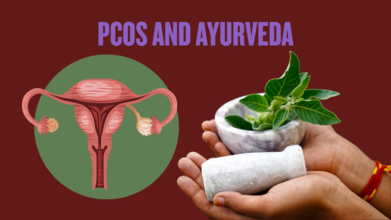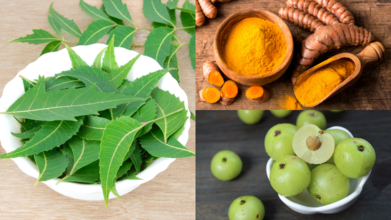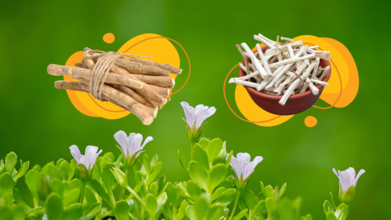- Health Conditions A-Z
- Health & Wellness
- Nutrition
- Fitness
- Health News
- Ayurveda
- Videos
- Medicine A-Z
- Parenting
- Web Stories
Can You Prevent Mpox Using Ayurveda?

Credit: Canva
Mpox continues to remain a global concern, with cases continuing to be reported globally, particularly in Africa. This viral zootonic disease, last year, triggered an emergency response by the World Health Organisation (WHO) after several people lost their lives to this infection. As per experts, it is caused by the monkeypox virus, which belongs to the Orthopoxvirus genus, the same family as the variola virus that causes smallpox. Symptoms of the disease include fever, muscle aches, and sore throat.
As the world continues to grapple with this infectious disease, many are turning to alternative systems of medicine for prevention and healing. One such system is Ayurveda, which offers a holistic approach to managing and preventing such diseases.
Epidemics Stem From Imbalance
Practitioners of Ayurveda believe that epidemics stem from an imbalance in nature and the collective weakening of individual immunity. This branch of medicine means "science of life" and underscores the concept of maintaining balance between three vital energies or doshas, that is, vata, pita and kapha. According to this 3000-year-old Indian system of medicine, preventing diseases like Mpox involves harmonizing the body and mind through diet, lifestyle, and mindful living.
Strategies To Prevent Mpox And Similar Diseases
Ayurveda prescribes a combination of dietary changes (that includes herbs) and lifestyle alterations to build up immunity against Mpox and other diseases. Here are some strategies that you can follow:
Dinacharya (Daily Routine)
Establishing a stable daily routine—including waking up early, regular exercise, and mindfulness practices like yoga and meditation—helps maintain physical and mental balance, which is key to building resilience.
Sattvic Diet
A sattvic diet, rich in fresh fruits, vegetables, whole grains, and legumes, supports detoxification and boosts immunity. Ayurveda emphasizes clean, natural, and seasonal foods for overall well-being.
Nasya (Nasal Therapy)
Applying medicated oils such as Anu Taila to the nasal passages helps strengthen the respiratory tract, which is particularly vulnerable during viral outbreaks. This practice is believed to create a protective barrier against airborne pathogens.
Panchakarma (Detoxification Therapy)
Therapies like Virechana (therapeutic purgation) and Abhyanga (medicated oil massage) aid in removing toxins from the body, revitalizing the immune system, and promoting internal balance.
Ayurvedic Herbs That Boost Immunity
Sure! Here's a more humanized and expanded version of each point, with an added line that brings warmth and relatability:
Ashwagandha (Withania somnifera)
Known for its adaptogenic properties, Ashwagandha helps reduce stress and strengthens the immune system. It is traditionally used to increase resilience against viral infections.
Think of it as a grounding herb that calms the mind while quietly preparing your body for whatever comes its way.
Guduchi (Tinospora cordifolia)
Guduchi, or Giloy, is regarded as an excellent immunomodulator. It helps in detoxification and boosts the body’s resistance to infections, making it ideal for strengthening immunity.
Often called 'Amrit' (nectar) in Ayurveda, Guduchi is like a gentle inner cleanser that supports you during seasonal shifts and stress.
Tulsi (Ocimum sanctum)
Tulsi, or Holy Basil, is revered in Ayurveda for its potent antiviral, antibacterial, and anti-inflammatory properties.
A cup of Tulsi tea isn’t just comforting—it’s like inviting a natural protector into your daily routine.
Can Ayurveda Restore Fix Fertility Issues In PCOS What Doctors Often Miss?

Credits: Health and me
For women grappling with fertility issues or irregular cycles, Ayurvedic practitioners often begin with something that feels surprisingly personal—understanding your prakriti, or unique body constitution. Instead of focusing solely on symptoms, the ancient system emphasizes balance: cleansing the body of toxins, restoring harmony among the three doshas, and gently resetting the system through lifestyle and herbal support. For women with polycystic ovarian syndrome (PCOS), this individualized approach can feel like finally being seen, not just diagnosed.
Conventional medicine has made enormous strides in managing health conditions, but when it comes to PCOS, most treatments stop at controlling symptoms with hormone pills, insulin sensitizers, or surgical interventions. The root causes—sluggish metabolism, chronic inflammation, and stress-driven hormonal chaos often remain unaddressed. This is where Ayurveda steps in, not as a replacement but as a deeper, more integrative path to healing.
“PCOS isn’t viewed only as a hormonal disorder; it’s seen as a reflection of deeper imbalances within the body,” says Dr. Manoj Kutteri, Ayurvedic expert in nutrition, acupuncture, yoga, and physical culture. “These imbalances can affect digestion, metabolism, and even mental and emotional well-being.”
Instead of targeting one hormonal pathway, Ayurveda examines the full picture: how your gut is functioning, whether your body can efficiently remove toxins, and how emotional stress shows up physically. This perspective transforms treatment from surface-level management to whole-body healing.
What Is The Role of Doshas in PCOS?
At the core of Ayurveda lies the concept of doshas—Vata, Pitta, and Kapha. Everyone carries all three, but in different proportions. PCOS is often linked to Kapha imbalance, which manifests as weight gain, irregular cycles, slow metabolism, and excess fluid retention. Still, no two women with PCOS present exactly the same way.
“By identifying your individual balance of these energies, Ayurveda designs a treatment plan that’s personalized to you, rather than relying on a one-size-fits-all approach,” Dr. Manoj explains.
For one woman, reducing Kapha heaviness through lighter, warming foods may bring relief. For another, calming Vata might be more important to regulate cycles and ease anxiety. The process is highly individual.
Detox as a Reset Button
A cornerstone of Ayurvedic care for PCOS is detoxification, or Shodhana Kriya. Unlike fad cleanses, these are gentle, physician-guided therapies aimed at clearing ama, toxic buildup that clogs the body’s channels and disrupts hormonal flow.
“Gentle Ayurvedic detox therapies help get rid of ama, which is built-up toxins that block different channels in the body and throw off the balance of hormones,” says the expert. Panchakarma, a series of cleansing therapies, may be recommended in clinical settings, while at-home practices like drinking warm herbal teas, body exfoliation, and mindful eating, serve as accessible daily rituals.
This cleansing process is less about deprivation and more about renewal. By unblocking energy channels and supporting digestion, detox helps the body find its rhythm again.
Lifestyle as Medicine
Unlike quick fixes, balancing the doshas requires sustained changes across all areas of life. Sleep, food, emotional state, and even how you process stress are all seen as part of the healing process.
“You must implement major, mindful lifestyle changes,” Dr. Manoj notes. “Everything from the type of food you eat to the quality and number of hours that you sleep, how you feel emotionally, how you deal with the stress in your body, and self-analysis, everything comes into the picture.”
Herbs such as Shatavari, Asoka, Punarnava, Guduchi, and Triphala often appear in treatment plans. But Ayurveda never prescribes herbs in isolation—they’re always woven into a broader program of nutrition, movement, and emotional balance.
Daily routines also play a central role. Eating freshly prepared meals, practicing gentle yoga, keeping regular sleep schedules, and cultivating emotional awareness aren’t just lifestyle “tips”; they’re considered medicine.
What Are The Signs of Healing from PCOS?
Ayurveda frames healing as a journey rather than a destination. Women with PCOS may first notice subtle shifts lighter digestion, more energy in the mornings, or a steadier emotional state. Over time, cycles regulate, skin clears, and metabolism steadies.
“Ayurveda encourages women with PCOS to listen and understand their bodies, restore their natural rhythm and harmony, and reconnect with their natural vitality and inner self,” says the expert. This philosophy reframes PCOS not as a lifelong battle but as an opportunity to deepen self-awareness and resilience.
Globally, PCOS has become one of the most pressing reproductive health issues, affecting up to 1 in 10 women of childbearing age. With rising rates linked to lifestyle, diet, and environmental stress, the condition demands more than band-aid solutions. Ayurveda’s individualized, root-cause approach offers a complementary path one that empowers women to take charge of their health and fertility.
What this really means is that Ayurveda doesn’t replace modern medicine, but it fills in the gaps addressing the subtle but crucial links between digestion, metabolism, stress, and reproductive health. For many women, this integrated lens offers both hope and tangible results.
PCOS can feel overwhelming, especially when conventional treatments focus narrowly on managing cycles or insulin resistance. Ayurveda broadens the view, inviting women to see their condition not as a permanent burden but as a signal to restore balance physically, emotionally, and spiritually. Healing isn’t instant, but it is possible, when the focus shifts from suppressing symptoms to nurturing the whole self.
Dr. Manoj Kutteri is a Ayurvedic and wellness expert with a comprehensive background in Mind-Body Medicine, Nutrition, Acupuncture, Yoga, and Physical Culture- Medical Director & CEO of Atmantan Wellness Center in India
Clear Skin in the Monsoon: 5 Ayurvedic Superfoods to Beat Breakouts from Within

Credits: Canva
The monsoon brings with it that dreamy smell of rain-soaked earth, endless chai cravings, and… surprise guests in the form of clogged pores, excess oil, and stubborn breakouts. Humidity and temperature swings are basically a free buffet for acne-causing bacteria. Most of us immediately reach for new face washes or a stronger toner, but according to Ayurveda, you might be missing the most important step, fixing what is on your plate.
“Seasonal changes can aggravate doshas, especially Vata and Pitta during the monsoon, leading to inflammation, acne, and rashes,” says Ayurveda practitioner Dr Madhumitha Krishnan. “Along with skincare, it is essential to bring balance through diet by choosing foods that are sweet in nature and slightly oily, which soothe the body and keep skin issues at bay.”
Here are her top five Ayurvedic superfoods that do more than taste good; they keep your skin glowing even when the weather is a mess.
1. Almonds
If almonds could talk, they would probably brag about how well they can multitask. Primarily sweet in taste and slightly oily in nature, they help balance both Vata and Pitta doshas, making them perfect rainy-season companions. Ancient Ayurveda, Siddha, and Unani texts all sing praises for almonds’ skin-enhancing abilities.
“They nourish the skin from within and maintain dosha balance during humid months,” explains Dr Krishnan. The trick? Soak them overnight. This makes them easier to digest and allows their nutrients to work deeper magic on your skin, keeping it supple and radiant.
2. Turmeric
This golden spice is not just for your grandma’s curries; it is basically edible skincare. Known for its antibacterial and anti-inflammatory powers, turmeric supports digestion (which in Ayurveda is key to skin health) and balances Vata dosha.
By slipping turmeric into your daily cooking, you help reduce the inflammation that often fuels acne. “It purifies the blood, wards off infections, and leaves the skin healthier from the inside out,” says Dr Krishnan. Think of it as the quiet hero who works behind the scenes, preventing those surprise breakouts.
3. Amla
Indian gooseberry, or amla, might be tiny, but it is a tridosha balancer with big skin benefits. It boosts immunity, slows down skin ageing, and helps detoxify the body, all of which lower your risk of monsoon breakouts.
“Amla is one of Ayurveda’s most powerful rejuvenators,” says Dr Krishnan. “Its detoxifying action removes impurities that would otherwise show up on the skin.” Whether you have it as juice, powder, or simply raw with a pinch of salt, your skin will thank you.
4. Neem
If breakouts are the troublemakers at the club, neem is the bouncer at the door. Its antibacterial, antifungal, and blood-purifying properties make it one of the most reliable Ayurvedic remedies for clear skin.
“Neem works by flushing toxins from the bloodstream,” explains Dr Krishnan. Neem juice might not win any taste awards, but it’s a small price to pay for skin that stays calm through the muggy season.
5. Garlic
Garlic might not win you any points in the “fresh breath” department, but it is a skin-saving legend. With its Vata-balancing qualities, it fights inflammation from within and supports overall detox.
Dr Krishnan says, “Many wellness experts recommend eating one raw clove of garlic on an empty stomach; it is a potent way to keep skin and overall health in check.” This practice has even gone viral on social media, proving that sometimes ancient remedies can become modern trends.
If you want to win the clear-skin game this monsoon, do not just attack the surface problem. As Ayurveda reminds us, beauty begins from within, quite literally. By adding almonds, turmeric, amla, neem, and garlic to your diet, you’re not just treating your taste buds; you are giving your skin an internal spa treatment.
Ashwagandha, Brahmi, Shatavari: Ayurvedic Trinity Every Woman In Her 20s Must Know

Credits: Health and me
Your 20s are usually described as the age of opportunity with new careers, new friendships, and the thrill of self-sufficiency. But behind that shiny veneer is a harsh reality most women manage to endure- mental pressure, unstable hormones, and the ever-present pressure to perform and present well. Throw in social media comparisons, irregular sleep, take-out lunches, and the occasional missed workout, and the body begins to trade on.
For most women, these are the years when they experience menstrual disturbances, mood swings, or initial signs of diseases like PCOD, thyroid disorders, or chronic fatigue. Conventional medicine prescribes treatments, but these are usually aimed at symptoms, not causes. Ayurveda, the traditional Indian system of medicine, addresses in a different manner - the balance of mind, body, and spirit before disease arises.
Three herbs, more than any others, have been proven over time in this tradition: Ashwagandha, Brahmi, and Shatavari. Used properly, this combination can assist women through the physical and emotional rollercoaster of their 20s with greater energy, clarity, and strength.
Brahmi for Stress and Mental Clarity
For most women in their 20s, stress is an inevitable friend. It tends to manifest as racing thoughts at night, difficulty concentrating throughout the day, or a nagging sensation of being "on edge." Brahmi, a traditional Ayurvedic adaptogenic herb, has been employed for centuries to calm the nervous system and clarify the mind.
Dr. Sane elucidates, "Brahmi balances the nervous system, calms anxiety, and enhances mental function. Its tranquility effect not only relieves tension but also aids in memory and concentration.
The science is aligned with tradition. Current research indicates Brahmi promotes neurotransmitter action, helping to improve mood management. For a woman balancing deadlines, social commitments, and individual aspirations, this translates into fewer mental whiplashes and smoother emotional steadiness. Ongoing use can make a subtle yet significant difference—converting fragmented attention into sustained focus and shattering mental fatigue with lucidity.
In contrast to speedy fixes such as caffeine, which provide temporary surges of energy with subsequent crashes, Brahmi's effects escalate over time. It doesn't render you drowsy it calms the mental static so you can think clearly about what's important without being wired or depleted.
Ashwagandha for Strength, Hormones, and Fertility
If Brahmi soothes the mind, Ashwagandha energizes the body. Dubbed the "king of herbs," Ashwagandha is renowned for its energizing properties. Its adaptogenic properties make it assist the body in adapting to physical and emotional stress.
Ashwagandha tones muscles, lowers fatigue, and increases energy levels," states Dr. Sane. "It's especially needed by women in their 20s, who tend to overlook their physical health in the process of keeping up with their hectic schedules.
But Ashwagandha's utility doesn't stop there. It's seriously associated with reproductive health, not just for stamina, but also for nourishing the ovum and hormonal balance. In women who have irregular cycles, menstrual cramps, or initial signs of hormonal imbalance, Ashwagandha provides a natural means of rebalancing. Science also suggests its value in maintaining healthy fertility, and thus it makes a great long-term reproductive health ally.
Shatavari for Hormonal and Vascular Health
Where Ashwagandha brings strength and Brahmi brings tranquility, Shatavari sustains. This herb is commonly referred to as the "queen of herbs" of female health. It's especially helpful for the reproductive system, assisting in regular menstrual cycles and relieving cramping periods.
"Shatavari is a hormone balancer and maintains healthy blood vessels, de-inflammating wherever stress and hormonal shifts usually inflame," Dr. Sane adds. Its rejuvenating action also includes immune system support so that the body's defense mechanisms are up and functioning.
The advantages of Shatavari radiate outward. Improved hormonal well-being tends to mean healthier-looking skin, steadier moods, and greater energy—effects of particular significance during the socially and professionally demanding 20s.
Why This Ayurvedic Trio is Best Combined?
Individually, each of these herbs is remarkable. Dr. Sane advises starting slowly: "A daily supplement, herbal tea, or even powdered form added to warm milk or smoothies can make a difference over time." Combined, they create a synergistic system of support:
Brahmi soothes the mind and increases focus, calming stress-related hormonal imbalances.
Ashwagandha builds the body, stabilizes stress response, and enhances reproductive energy.
Shatavari supports hormonal well-being, guards the vascular system, and preserves reproductive vigor.
This multi-faceted strategy tackles the entire range of females' troubles in their 20s — from the mental burden to physical endurance to long-term hormonal equilibrium.
Safe Use and Real Tips
Though these herbs are natural, they're not a one-size-fits-all remedy. Dosage and preparation come into play. In Ayurveda, herbs are frequently ingested as a powder with warm milk or water, or as capsules for convenience. General advice:
- Use high-quality, certified herbal supplements to ensure purity.
- If pregnant, breastfeeding, or on medication, seek guidance from a qualified healthcare practitioner before beginning.
- Herbs are most effective when used with balanced diet, regular exercise, and proper rest.
Ayurveda understands herbs in terms of a larger context. For women aged 20, combining these remedies with conscious eating, daily yoga or weight training, and electronic downtime can enhance effects.
Easy habits such as beginning the day with a quick meditation, consuming fresh seasonal produce, and maintaining an even sleep schedule can increase the impact of Brahmi, Ashwagandha, and Shatavari.
Your 20s aren't merely about bracing yourself against deadlines or pursuing milestones—they're about developing resilience, both physically and emotionally. "Consider this decade as your investing years for your future health," Dr. Sane suggests. "What you do now will determine how you feel in your 30s, 40s, and so on."
They're not wonder pills, but resources to assist you in getting through the demands of this decade without giving up your well-being. Amidst a society that celebrates hyperwork and perfectionism, electing to look after your mind and body is a gentle form of rebellion — and an investment in your healthiest future.
Dr Rohit Sane is ayurvedic doctor and CEO & MD at Madhavbaug, India
© 2024 Bennett, Coleman & Company Limited

